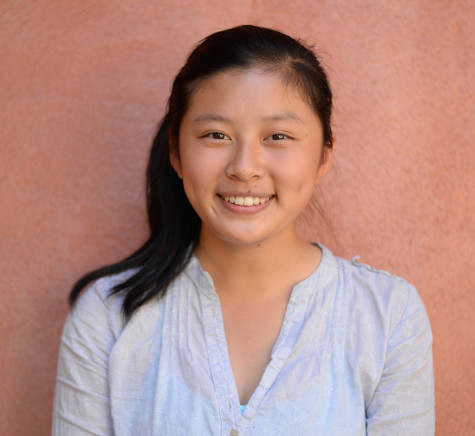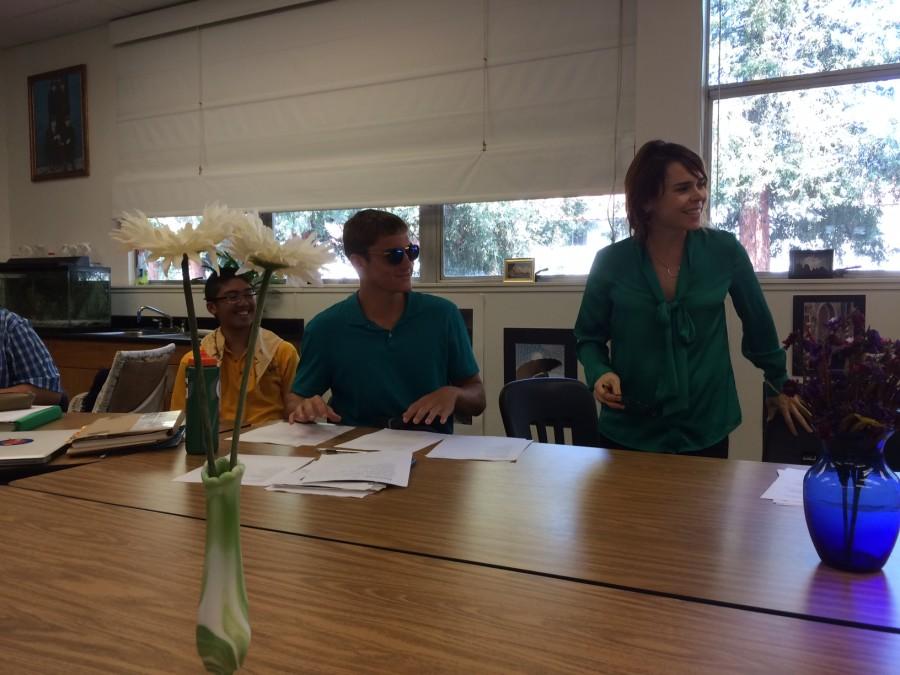A look inside Theory and Practice of Poetry and Fiction
As the last drop falls, a silence blankets the room. Ten, twenty seconds pass.
“That ending was very intriguing.”
Welcome to Theory and Practice of Poetry and Fiction, affectionately nicknamed TPOPF (pronounced tee-pop, with a silent f), where timed writings and strict rules go out the window and creativity floods Alexandra Rosenboom’s classroom every 5th period. Aside from the poetry and fiction read and discussed in the course, the selling point is the class’s roundtable workshops.
“It’s more like a community in the sense that we’re all gathering together to comment on each others poems and its really interesting and fun,” said Austin Lai (12).
Every Thursday and Friday, the class gathers around a long oval table and reads over work written by each student, discussing each piece in depth for 15 minutes. This setup is designed to mimic a real poetry workshop group, and has proved effective. However, despite the emphasis placed on creating a supportive environment, students still experience some warranted anxiety when their poems are the ones being analyzed.
“I guess its kind of nerve-racking at first because right after someone first reads your poem you’re just waiting for someone to say something but after you hear what they have to say they always say the positives first and then they give you something to improve on,” said Priscilla Pan (12).
Because the workshop pieces are rarely given a specific prompt, students are free to write whatever they feel inspired to create.
“I really enjoy how creative [the class] lets us be, because unlike any other English class, we can write about whatever we want without and rules or guidelines to tell us where to go,” said Jai Ahuja (12). “Every other class always has a rubric and a strict curriculum, meaning if we want to do well, we should stick to those. TPOPF is really a chance for us to grow as writers and challenge ourselves to create something unique, without having us worry that our writing won’t get us an ‘A.’”
TPOPF’s 5th period has become less of a class and more of a group of friends going on random tangents and helping each other write better.

Fred Chang (12) is the Managing Editor of the TALON Yearbook and co-creator of In a Nutshell. Her positions on yearbook were reporter, Copy Editor, and...




![LALC Vice President of External Affairs Raeanne Li (11) explains the International Phonetic Alphabet to attendees. "We decided to have more fun topics this year instead of just talking about the same things every year so our older members can also [enjoy],” Raeanne said.](https://harkeraquila.com/wp-content/uploads/2025/10/DSC_4627-1200x795.jpg)


















![“[Building nerf blasters] became this outlet of creativity for me that hasn't been matched by anything else. The process [of] making a build complete to your desire is such a painstakingly difficult process, but I've had to learn from [the skills needed from] soldering to proper painting. There's so many different options for everything, if you think about it, it exists. The best part is [that] if it doesn't exist, you can build it yourself," Ishaan Parate said.](https://harkeraquila.com/wp-content/uploads/2022/08/DSC_8149-900x604.jpg)




![“When I came into high school, I was ready to be a follower. But DECA was a game changer for me. It helped me overcome my fear of public speaking, and it's played such a major role in who I've become today. To be able to successfully lead a chapter of 150 students, an officer team and be one of the upperclassmen I once really admired is something I'm [really] proud of,” Anvitha Tummala ('21) said.](https://harkeraquila.com/wp-content/uploads/2021/07/Screen-Shot-2021-07-25-at-9.50.05-AM-900x594.png)







![“I think getting up in the morning and having a sense of purpose [is exciting]. I think without a certain amount of drive, life is kind of obsolete and mundane, and I think having that every single day is what makes each day unique and kind of makes life exciting,” Neymika Jain (12) said.](https://harkeraquila.com/wp-content/uploads/2017/06/Screen-Shot-2017-06-03-at-4.54.16-PM.png)








![“My slogan is ‘slow feet, don’t eat, and I’m hungry.’ You need to run fast to get where you are–you aren't going to get those championships if you aren't fast,” Angel Cervantes (12) said. “I want to do well in school on my tests and in track and win championships for my team. I live by that, [and] I can do that anywhere: in the classroom or on the field.”](https://harkeraquila.com/wp-content/uploads/2018/06/DSC5146-900x601.jpg)
![“[Volleyball has] taught me how to fall correctly, and another thing it taught is that you don’t have to be the best at something to be good at it. If you just hit the ball in a smart way, then it still scores points and you’re good at it. You could be a background player and still make a much bigger impact on the team than you would think,” Anya Gert (’20) said.](https://harkeraquila.com/wp-content/uploads/2020/06/AnnaGert_JinTuan_HoHPhotoEdited-600x900.jpeg)

![“I'm not nearly there yet, but [my confidence has] definitely been getting better since I was pretty shy and timid coming into Harker my freshman year. I know that there's a lot of people that are really confident in what they do, and I really admire them. Everyone's so driven and that has really pushed me to kind of try to find my own place in high school and be more confident,” Alyssa Huang (’20) said.](https://harkeraquila.com/wp-content/uploads/2020/06/AlyssaHuang_EmilyChen_HoHPhoto-900x749.jpeg)



